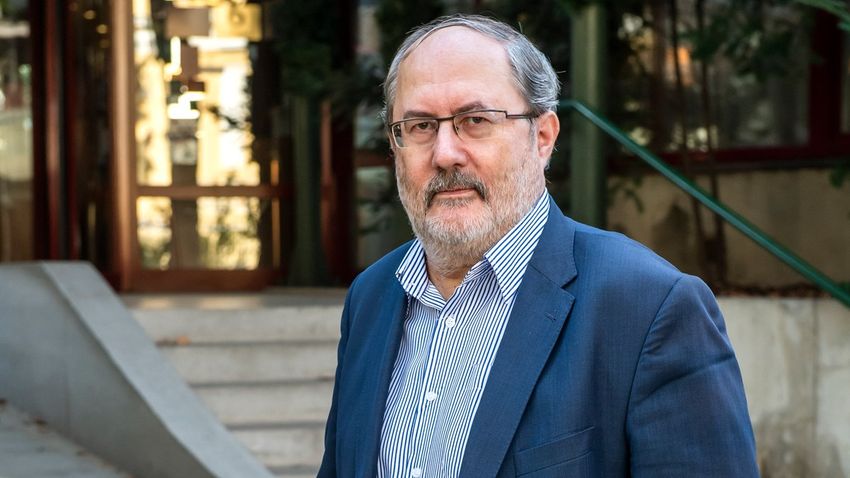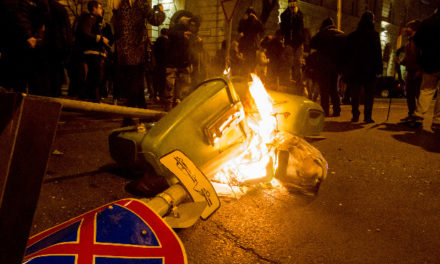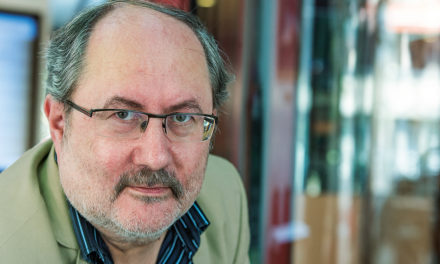It's slowly becoming a hopeless task to keep track of the number of threats and blackmails facing Hungary from the direction of the European Union, but it seems that all threats are being thrown down our necks at the same time. The latest is the joint French-German transformation plan, which would put small countries in a completely impossible situation. Our paper conducted an interview with political scientist Tamás Fricz.
Two years ago, political scientist Tamás Fricz pointed out that under certain circumstances we should consider whether to remain members of the Union. Many people believe the same thing today. Although there may not be many reasons for it, has your opinion changed in two years?
It definitely became more nuanced, but not in the sense that I now see the European Union as a well-functioning organization. Two years ago, I really brought up the idea of Huxit, but not in the way it was broadcast, but in the way that situations may arise where it is simply not worth staying in the Union, because the country faces disadvantages that we cannot offset, either economically, it cannot be tolerated either socially, culturally or politically. Two years ago, I put it bluntly, which I would now refine by stating that there are several variations of what can be done with the entire institutional system of the European Union. There is no doubt that this institutional system is clearly in crisis, which shows several signs. There is no real, decisive leadership of the European Union, and it happens more and more often that what the European Commission is doing is unacceptable for either one or the other member state – not always the Poles and Hungarians. An important change in the last two years is that
the European Commission seized power in an amazing way, which it does not belong to, because it is not included in the basic treaties.
You and others put it this way, that it has started to behave as if it were a European government above the member states.
Exactly. He began to evaluate, classify, and condemn countries, and initiate proceedings against member countries, especially against us and the Poles. They act as if their decisions should be accepted by everyone without objection or consideration. We can even think of the latest developments. When, for example, Commission President Ursula von der Leyen tells Ukrainian President Zelensky that it is quite wonderful how the Ukrainians are preparing for EU membership during the war, you can even laugh at yourself, because this is such a baseless statement that it really cannot be taken seriously. He only announces that the goal is for Ukraine to become a member of the Union as quickly as possible, but he does not discuss this with anyone. He announces this alone, which is shocking. It was also shocking when he and the president and CEO of Pfizer, a certain Albert Bourla, agreed via SMS to buy 1.8 billion vaccines for 35 billion euros. This went against the requirement of transparency to such an extent that it was already apparent that there is something very wrong with the EU institutional system. And now I would turn to how my opinion became more nuanced. I think,
it is not certain that in this situation it would be most expedient to withdraw immediately, rather we should think about how to reshape the Union.
The possibility of radical transformation should be offered to certain groups of countries at some level, because it is clear that the Union is simply not on top of the situation.
The idea of a radical transformation has already been raised, but not in the way we would like. I am thinking of the new German-French initiative, the element of which, for example, is to end consensus decision-making, so that the Brussels elite can decide, like the government of a United States of Europe, about which country's business and what it must do, and only the "big ones" can take part in the decisions ” they would have a say. So there is a radical restructuring proposal, but its adoption would clearly point towards the birth of the United States of Europe, so I don't think we would have much luck with that.
We really have this Franco-German plan in front of us, which is really radical, but radical in the worst possible way, and the exact opposite should happen, also in a radical form. By the way
the idea of the United States of Europe, dear readers, was first introduced by Churchill in his speech in Zurich in 1946,
so the idea is quite old. And behind Churchill stood the certain Mr. Coudenhove-Kalergi, who started the pan-European movement in 1922. He was the one who thought about a mixed-race Europe, explaining that Europe must change in terms of ethnicity and race, and that the nation-states must be repressed, because they are the main culprits in all matters, they are the main causes of wars. This idea was adopted by Churchill after the Second World War. By the way, there is also a huge mistake in our conservative circles when we say that we should return to the ideas of the founding fathers, which is based on strong nation-states. Unfortunately, this is not true, because those who created the European Coal and Steel Community, such as Jean Monnet, Paul-Henry Spaak, or the black-belt communist Altiero Spinelli, were already thinking about the United States of Europe, they just wanted to achieve it gradually. So
when the Franco-German proposal came into being, practically nothing happened other than a kind of radicalization of the ideas formulated 70 years ago, which otherwise had American and Masonic roots.
If they somehow manage to get this proposal through, it would mean the birth of a centralized empire that would push the smaller member states into practically complete vulnerability.
What is included in the Franco-German proposal is really to abolish the principle of consensus decision, that is, the right of veto of the member states on the most important issues, or perhaps on all issues. I think this is a red line in that it would make it questionable whether it is worth continuing this type of operation.
Because if somehow - and now I would quote a classic - they can carry out their plan with hundreds of tricks, it would be possible for the major states, especially the French and Germans, to make the majority decisions, so an empire would really be created in which the member states would simply submit to the the interests and goals of the determining member states.
In my opinion, this is a breaking point, so if the principle of consensus, which de Gaulle fought for and was able to preserve at the time, ceases, then I also say that from then on, further cooperation is difficult.
Quite a few examples have already shown that the left-liberal, neo-Marxist wing of the Union elegantly bypasses the EU rules, if its interest dictates it, and uses the "hundreds of tricks" you mentioned to circumvent the rules. What can we do about it?
There are opportunities, you just have to use them. Recently, there was a certain international forum in Poland, where more than five thousand participants were present. The conference was held under the title "New values of the old continent - Europe on the edge of change" and the countries of Central and Eastern Europe took part in it. At the conference, Ryszard Terlecki, the vice-president of the Polish Sejm and the leader of the faction of the ruling party, stated that the idea of a federal Europe is a crazy idea, on the other hand, he suggested that
the states of the region, i.e. the countries of Central and Eastern Europe and partly of the Western Balkans, are considering the establishment of joint regional institutions.
For example, the Parliamentary Assembly of Central and Eastern European countries is established. Other speeches also urged that the V4 and the Three Seas initiative set out on their own, create their own federal institutions with the aim of having a force within the Union that cannot be ignored. So, Mr. Terlecki was not talking about breaking up the Union and leaving it one by one or all at once, but rather about trying to create an alternative within the Union, which can really strongly influence what happens in the Union.
The idea is great, since we are always blamed for the alleged lack of checks and balances, so there you have it, the check and counterbalance against the French-German block can be found here.
That's right, because that's what's missing right now. At the moment, we see in the European Union that a kind of political ideology, a kind of political view system, a kind of political world view, which we can call liberal, we can call globalist, but mostly both at the same time, this has dominated the functioning of the European Union, and if we ever talked about equal parties form the Union, then this is no longer the case. A single stream of ideas dominates the European Commission, but also the European Parliament. Which is not surprising, since it is an open secret that roughly two hundred and twenty-six of the seven hundred representatives of the European Parliament are simply on Soros' payroll, i.e. György Soros has the largest faction. It was also revealed that one third of the twenty-seven commissioners of the current European Commission are closely connected to the Soros empire and receive their instructions from there. I wonder where the checks and balances are?
There is a dominant current, this globalist liberal society, which wants to impose its will on all issues, even against the will of the member states, and any member state that resists this is attacked.
Mostly we and the Poles are like that, although they may have scored a good point in connection with the Ukrainian-Russian war, but they are still sitting on the penalty bench. However, we are primarily the black sheep. It is no coincidence that Viktor Orbán said in his opening speech to the parliament that the next months until the European Parliament elections will be about preserving our political, economic and cultural sovereignty, because this is really what is at stake. Of course, it is very difficult to do this alone, and that is why I tried to draw attention to the fact that there are such forums, gatherings, and initiatives here, which feel that we are connected to each other, that we preserve the European spirit, culture, Christianity, among other things, which the Western countries abandoned it a long time ago. Churchill spoke sometime in forty-seven that an iron curtain had descended between Eastern and Western Europe. If he were still alive, he might now be able to talk about the fact that a cultural iron curtain is rising between us, and therefore enormous efforts are needed in order for the Union to be able to stay together at some level. It is not an easy task, but it is obviously a primary goal. I add that it is not a goal at all costs, because we have to realize that there are situations when separation is better than staying together. But as long as possible, let's try to stay together and cooperate, as long as both sides have the intention to do so.
It is also stated in the transformation plans that if this cannot be carried through, then there will be a 4-speed Europe, which I do not know how it could work, but the fact is that we are excluded from the so-called upper circles, so there is now even the semblance of equality here is avoided.
This transformation idea is the idea of breaking up the Union, where there are first-class members who belong to the vanguard, so to speak, to use such a communist word, and then there are the others, the runaways, who are there at some level, but actually have a say in the it is not the business of adults.
But the adults have a say in the affairs of the little ones.
Oh yes, in this it is very democratic and rule of law that it would become a completely disproportionate and hierarchical relationship. So we are really approaching a dividing line, we have to answer the question of how to proceed. In the European Council, in the Council of Prime Ministers and Heads of State, there is still a kind of equality, even the right of veto prevails, but the European Commission and of course the European Parliament do not represent the interests of European citizens on the one hand, nor do they represent the interests of a significant part of the European member states. What follows from this? In my opinion, we have to change our emotional and spiritual attitude. It is often said that the heart of Europe is the European Union, but in my opinion, unfortunately, it is not anymore. The European Union has become a bureaucratic, corrupt organization representing interests from elsewhere. It follows that anyone who harbors negative feelings about the European Union and says so is far from being anti-European. Anyone who criticizes, even radically criticizes the institutional system of the European Union, as I do, is not against Europe, on the contrary, they are attacking an institutional system that represents completely different interests and values. The leadership of the Union, the Brussels elite, practically represents two large interest groups. One is a huge empire, the United States, and its democratic side, and Ursula von der Leyen does everything the Democrats dictate to her. This is also clearly visible in connection with the war in Ukraine. If necessary, Biden will assign it to you and tell you how to approach China and how to impose sanctions.
It turned out that they were already discussing the sanctions in the fall of 2021, when the war had not even started.
How interesting, isn't it? As if they somehow guessed that Russia would soon attack Ukraine.
They must have used a fortune teller.
How interesting, isn't it? Perhaps they had some part in the matter and perhaps this matter is not independent of them to the extent that they sufficiently provoked this war. But let's put this in parenthesis now. So
on the one hand, the EU bureaucracy is under the control of the United States of America, and on the other hand, a broad, global financial elite is integrated into the important European institutional systems.
With its lobbying organizations and established people - for example, from Vera Jurova to Frans Timmermans, we could mention many names - they exert a strong influence on what the European Union should do, what it should do in various issues. This is proven, for example, by the fact that Ursula von der Leyen, who is the chairperson of the committee, is a member of the board of trustees of the World Economic Forum led by Klaus Schwab. This is a globalist organization, an organization with enormous power, whose meetings Leyen has attended several times and who enthusiastically supports Klaus Schwab's ideas about globalist world governance. I ask
Who is Ursula von der Leyen's real boss? Is it the European people, or perhaps the leader of the World Economic Forum?
In theory, we should have high hopes for next year's European Union elections for all of this, but to be honest, it is hard to believe that voting can bring about serious changes. The Western citizens of Europe have been so dumbed down that it is difficult to expect normal thoughts and decisions from them. On the other hand, and this is also incidental, if they vote right, they still vote left.
Unfortunately, I agree that the thinking of a significant part of the electorate of so-called Western Europe has changed quite a bit over the past years, they really think quite differently than we do about things that are unacceptable and intolerable for us, such as pride parades, the LGBTQ movement, gender madness and, of course, the migrant issue.
Unfortunately, I am also afraid that a big breakthrough cannot be expected in next year's European elections, and should not be expected.
It can be trusted that because of the war and the typical atrocities from Sweden to France, which happen to the citizens on the part of the migrants, perhaps it will be heard in several European citizens that this is enough. This can give some hope that the proportions will perhaps change in the direction of the good, i.e. in the sovereignist direction, against the globalists. And if this happens, and all the sovereign forces can be brought together, there is hope for change. Unfortunately, the European People's Party is less reliable from this point of view, and has already shifted well to the left, but there is the Identity and Democracy group, and there is the Conservative faction group, so they can become stronger and form a counterweight that cannot be swept off the table. It is to be hoped that our side will get stronger, but it will not be the kind of breakthrough that would change the entire European Union.
However, the change would be very much needed, if for no other reason, in order to reduce the excess power of the European Commission.
That is why the point is that after the elections, a very strong sovereignist alliance will be created and pressure will have to be exerted so that a president similar to the current one cannot become the head of the committee. There should be reforms that restore the EC to its original function, i.e. to be the guardian of rights, an office that implements the will of the member states, not dominates the member states. This, for example, would be an extremely important radical reform. Viktor Orbán is right that instead of the current European Parliament, which is essentially under globalist-liberal rule, the EP should be made up of delegates from national parliaments. This new organization would be much closer to national interests than the current one. By the way, this was the case until 1979, only after that came the new electoral system, which is a rather controversial story. Because the citizens are primarily Hungarians, Poles, French, Germans and so on, and only secondarily Europeans, which is why these elections always have a bit of a domestic political flavor. In this regard, many questions should and should be thought through, because Europe is in a downward spiral economically, socially, in all forms. So it is inevitable that we have to do something with this whole issue, otherwise Europe will slide down in the world economy as well, and it will be very difficult to get back up from there. It is important not to give up hope, because there is plenty of opportunity for Hungary and the other nation-states to act. We are very strong in this, we have always been strong, I am very confident that Hungary will continue to be at the forefront of the struggle for sovereignty.
The interview was conducted by: György Tóth Jr
Cover photo: Fricz Tamás Facebook












